Nuts are found in all cuisines of the world and are a part of many dishes. They are a great base for dressing, oils, nut butter, various desserts, and healthy smoothies. Everyone loves to crunch nuts while watching their favorite TV series or in the middle of a working day. Do nuts work well with your diet? Are nuts keto?
Yes, most nuts are keto. They contain a lot of healthy fats and very few carbohydrates. Therefore, they are a great option for the keto diet. However, there are types of nuts that are higher in carbohydrates and are unacceptable during a low-carb diet.
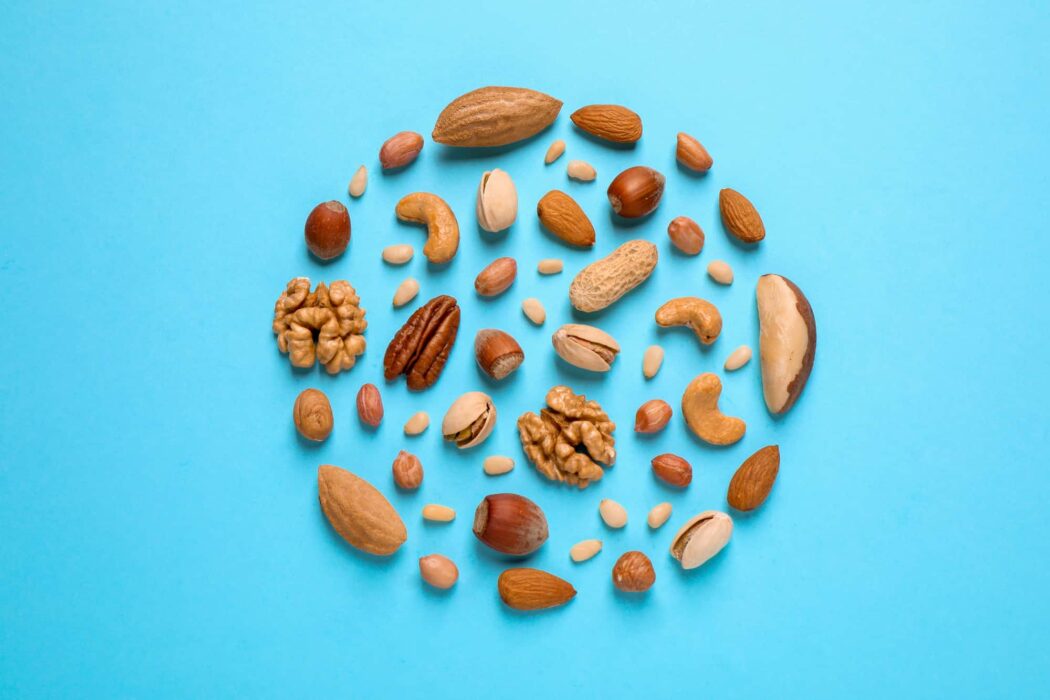
So, generally, nuts are keto, but they contain some carbs and a lot of calories. It is easy to overeat them because it is difficult to stop, and one handful of nuts can exceed your daily carbohydrate limit. How many carbs are in nuts? Which nuts are keto? Let’s see which ones are best to keep your keto diet healthy. Keep reading for all the details!
Non-keto Nuts to Avoid
Cashews
Are cashews keto? 100 grams of cashews contain:
- 553 calories
- 18 grams of protein
- 43 grams of fat
- 30 grams of carbohydrates
- 3 grams of fiber
- 27 grams of net carbs.
Cashews are not keto. A couple of cashews won’t stop your ketosis, but be careful with them, as they contain too many carbs.
All the Truth about Keto-friendly Fruits
Cashews are packed with a variety of beneficial elements. They include vitamins (thiamine, niacin, riboflavin, tocopherol), minerals, and antioxidants. Also, cashews are full of Omega-3 and Omega-6 fatty acids, carbohydrates, proteins, and dietary fiber. Among all known types of nuts, cashews lead in the content of magnesium, potassium, and iron.
Eating cashews does not lead to weight gain and allows both men and women to maintain weight at a healthy level. Also, due to the presence of copper and magnesium in the composition, these nuts increase bone strength and prevent the development of osteoporosis. And due to the content of large amounts of fiber, they prevent constipation, maintain the microflora composition, and reduce the risk of colon cancer.

Chestnuts
Are chestnuts keto? 100 grams of chestnuts contain:
- 213 calories
- 3 grams of protein
- 3 grams of fat
- 45 grams of carbohydrates
- 8 grams of fiber
- 37 grams of net carbs.
Chestnuts are not keto. Chestnuts contain too many carbs, so be sure to avoid them during a keto diet. However, if you follow a mild low-carb diet, you can add a couple of chestnuts to your weekly meal plan for great health benefits.
Chestnuts are an important source of starch and sugars, but they are very low in fat compared to other nuts. They contain a generous dose of tannins and pectin substances, fiber, proteins, vitamins of group B, as well as A and C, calcium, magnesium, potassium, and other useful elements.
A positive effect on the human body is produced due to the number of fats, proteins, and tannins contained in chestnuts. The increased content of starch and carbs makes this food a real energy bomb, activated when it enters the body and releases a huge amount of energy. It is very useful for athletes before and after a hard workout.
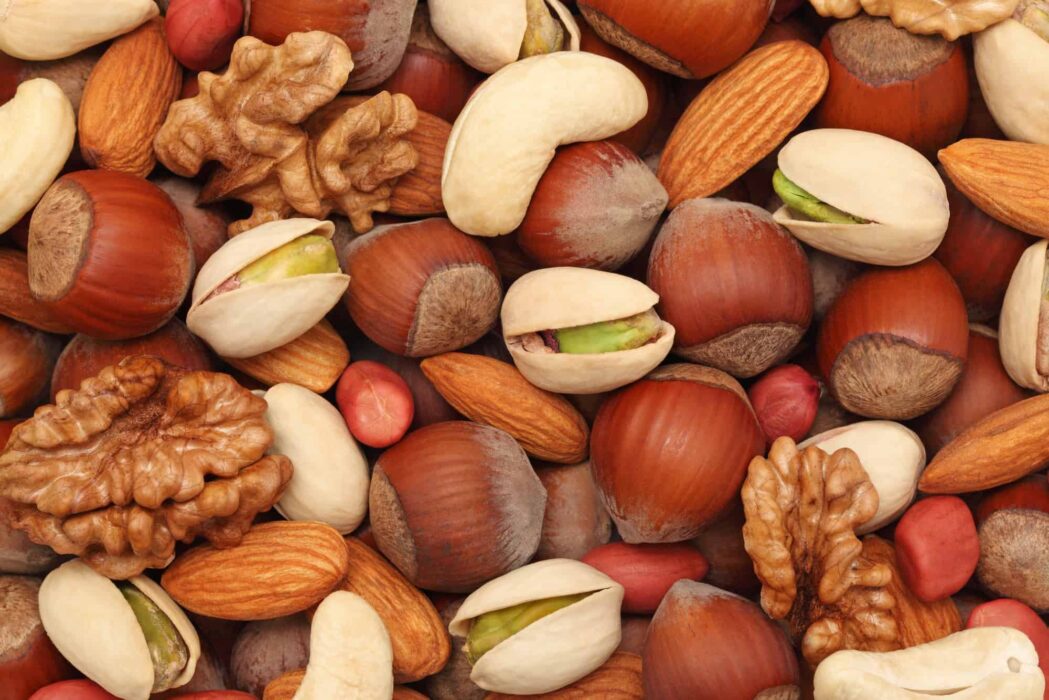
Pistachio
Are pistachios keto? 100 grams of pistachios contain:
- 557 calories
- 20 grams of protein
- 44 grams of fat
- 28 grams of carbohydrates
- 10 grams of fiber
- 18 grams of net carbs.
Pistachios are not keto. Pistachios contain many carbs, but you can sometimes add a small amount to your keto diet. Just make sure you don’t eat more than 20 grams of carbs per day.
Magnesium, phosphorus, zinc, and B vitamins are the main elements of pistachios. One of the main elements they contain is vitamin B7, or biotin, which allows the protein to be absorbed and fat to burn. It is key in metabolism. If your body lacks biotin, then hair and skin suffer, a depressed mood appears, and the level of bad cholesterol in the blood can rise.
Food Craving List: Reasons and Healthy Alternatives
Pistachios have an antioxidant and refreshing effect, reduce the risk of cancer, and inhibit the aging process. They are called nuts of youth as they have a beneficial effect on blood vessels and brain activity. Calcium accumulating in nuts is of particular value for bone tissue. Pistachio nuts have anti-inflammatory and expectorant effects, strengthen the immune system, heal the gastrointestinal tract, strengthen the eye muscles, help cleanse your body of toxins, etc.
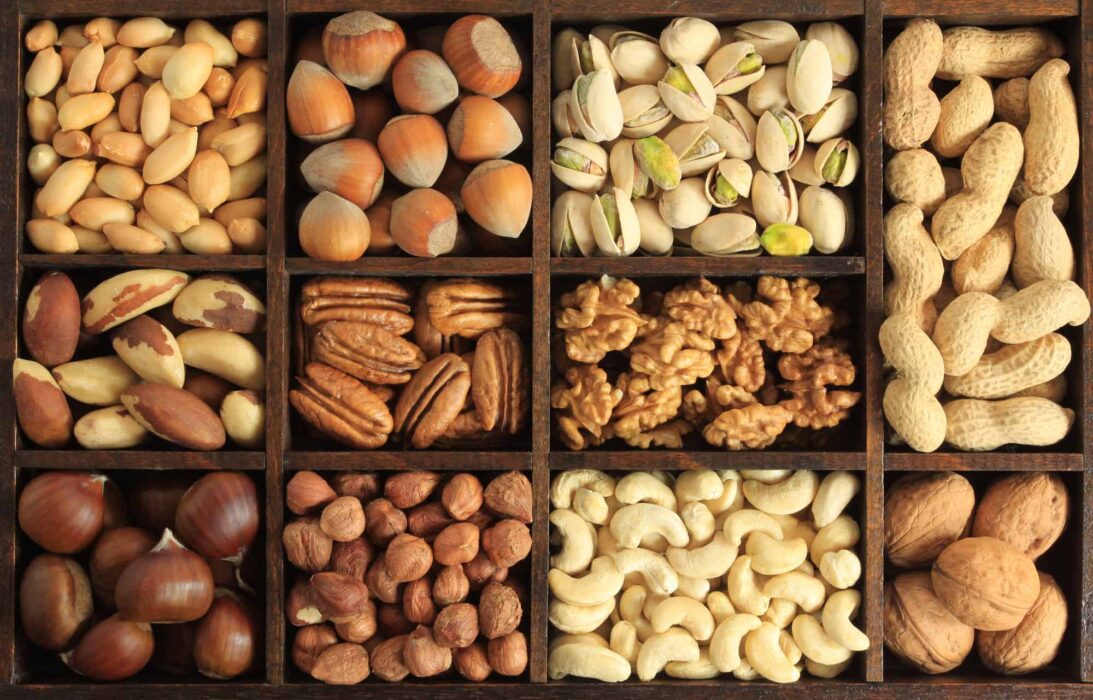
Tiger Nuts
Are tiger nuts keto? 100 grams of tiger nuts contain:
- 369 calories
- 4 grams of protein
- 26 grams of fat
- 32 grams of carbohydrates
- 18 grams of fiber
- 14 grams of net carbs.
Tiger nuts are not keto. This nut contains a moderate amount of carbs, but most of them are starchy and can stop your ketosis.
Tiger nut, which is actually a tuber, contains a large number of essential amino acids, vitamins B, C, and E, as well as macronutrients. 150 g of tiger nuts cover the daily requirement of an adult for vegetable fats and essential acids. These tubers do not contain gluten, so their use is allowed if you are intolerant to this vegetable protein.
Tiger nut fights the pathogenic environment and reduces inflammation. It is used to prevent and treat colds, cleanse the body, remove toxins and radionuclides. This nut restores strength, activates immunity, gives a burst of energy, soothes and relieves stress. Tiger nut is recommended for people suffering from insomnia and nervous system disorders because it improves memory and stimulates the brain. It also stimulates the activity of the intestines and accelerates metabolic processes. As a result, food is better digested and absorbed. It has a positive effect on the heart and blood vessels, breaks down cholesterol, strengthens blood vessels, and is used to prevent atherosclerosis.
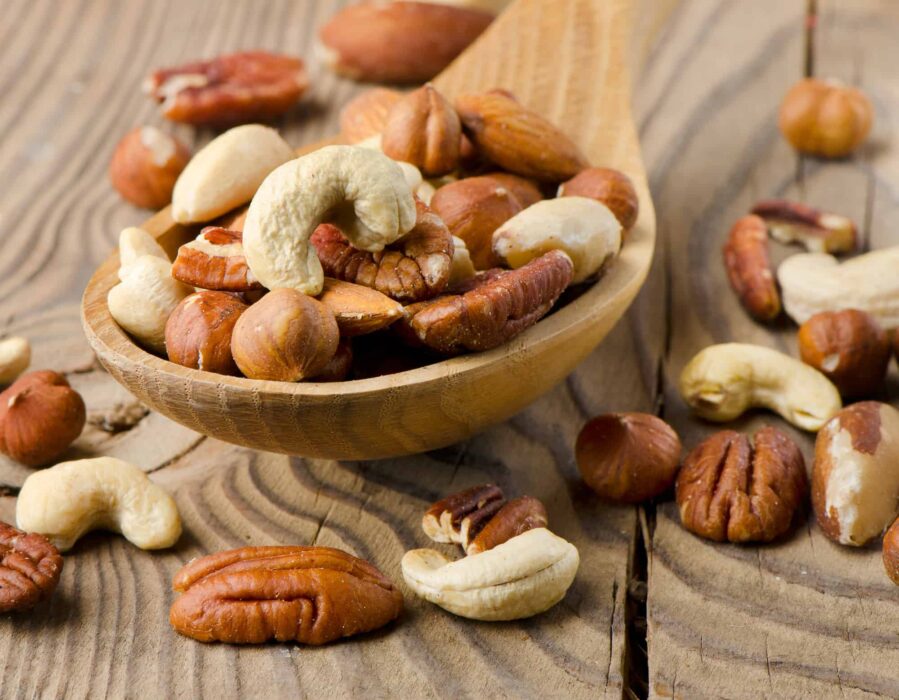
Best Nuts for Keto
Almonds
Are almonds keto? 100 grams of almonds contain:
- 578 calories
- 21 grams of protein
- 51 grams of fat
- 19 grams of carbohydrates
- 12 grams of fiber
- 7 grams of net carbs.
Almonds are keto. Almonds are considered an excellent source of calcium, iron, magnesium, phosphorus, and potassium. They contain a lot of B vitamins, as well as tocopherol (vitamin E). Almonds are good for the cardiovascular system as they contain a lot of unsaturated fats, amino acids, and minerals. They are rich in plant flavonoids, which are activated by vitamin E.
To maintain the nervous system and normal brain function, consuming one handful of almonds per day is recommended. For women aged 50+, almonds can help cope with hormonal changes, dementia, and Alzheimer’s disease. The plant antioxidants found in almonds normalize sleep and relieve senile insomnia and seasonal depression.
Fatty acids protect the body from the excessive flow of glucose into the bloodstream. Therefore, almonds are good for people with diabetes, and they also have a beneficial effect on microcirculation and the immune system.
Dietary fiber helps cleanse the body, nourishes the intestinal microflora with beneficial bacteria, and affects prebiotic function. It is important to combine almonds with foods containing many antioxidants – vitamin C, A, zinc, and selenium.
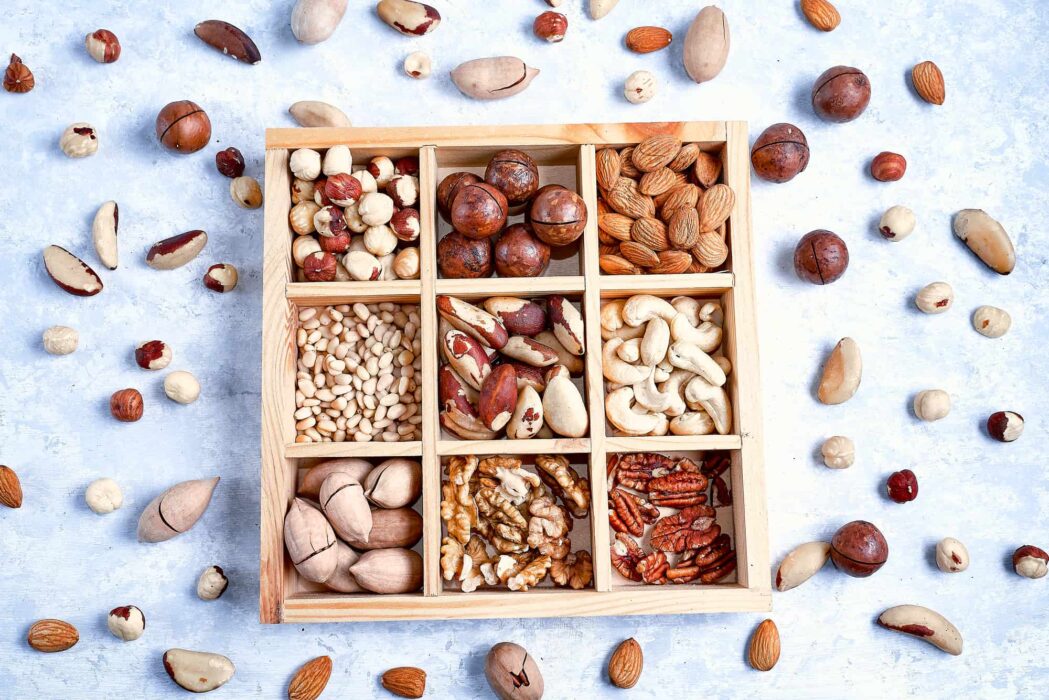
Marcona Almonds
Are Marcona almonds keto-friendly? 100 grams of Marcona almonds contain:
- 589 calories
- 22 grams of protein
- 53 grams of fat
- 18 grams of carbohydrates
- 12 grams of fiber
- 6 grams of net carbs.
Marcona almonds are keto. Marcona almonds are produced in Spain and are slightly different from our usual almonds. These nuts are a bit rounder than California almonds, and they also have a slightly sweeter taste and aroma, similar to the almond extract we are used to. They match macadamia in density.
Marcona almonds are a rich source of vitamins and minerals, that positively affect the cardiovascular system, improve metabolism, and maintain good vision. Regular consumption of Marcona almonds promotes the production of beneficial bacteria in the gastrointestinal tract that improves digestion.
These nuts are good sources of protein, which is especially important for vegetarians on a keto diet. Almonds contain minerals (zinc, magnesium, and iron) and vitamins B and E, natural antioxidants that help fight heart disease. Marcona almonds are also a good source of magnesium and calcium.
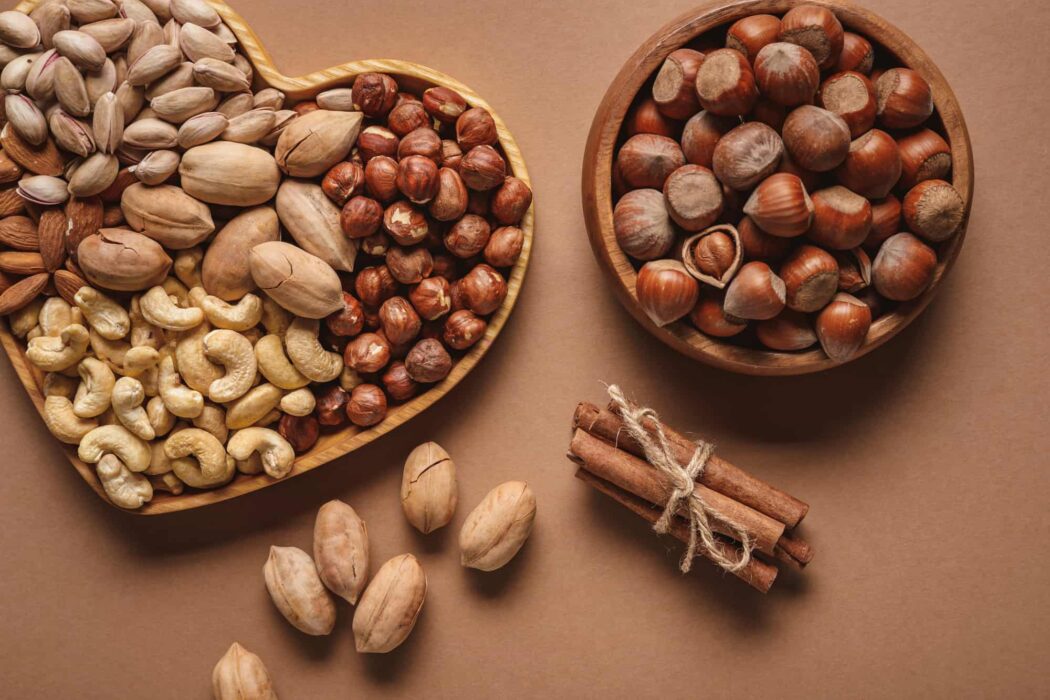
Brazil Nuts
Are Brazil nuts keto? 100 grams of Brazil nuts contain:
- 626 calories
- 16 grams of protein
- 68 grams of fat
- 13 grams of carbohydrates
- 9 grams of fiber
- 4 grams of net carbs.
Brazil nuts are keto. Brazil nuts contain many nutrients – protein, fiber, magnesium, phosphorus, thiamine, and selenium. It also contains a significant amount of niacin, vitamin A, E, B6, copper, iron, potassium, calcium, and zinc. Brazil nuts are a good source of arginine (an amino acid that promotes blood clotting) and flavonoids (antioxidants important in preventing cardiovascular and cancer diseases). Brazil nuts contain fat, which is unsaturated fat that helps lower cholesterol.
This nut contains alpha-linolenic acid, which is an Omega-3 polyunsaturated fatty acid that reduces the risk of heart disease. Brazil nuts help normalize blood sugar levels and help reduce bad cholesterol in the body. A couple of nuts a day will help strengthen the nervous system and cope with stress.
This nut has a refreshing effect since it makes up for the lack of selenium in the body. Namely, selenium does not allow people to age prematurely. In addition, selenium, which is found in only a few foods, strengthens the immune system and is also a protective agent against cancer development.

Coconuts
Are coconuts keto? 100 grams of coconuts contain:
- 354 calories
- 3 grams of protein
- 33 grams of fat
- 15 grams of carbohydrates
- 9 grams of fiber
- 4 grams of net carbs.
Coconuts are keto. Coconut pulp is rich in antioxidants, healthy fats, ascorbic acid, B vitamins, vegetable protein, and minerals. Zinc and selenium support the regular functioning of the thyroid gland, and iron is necessary for the production of red blood cells. Magnesium provides electrolyte balance. Potassium takes care of nerve function, and copper reduces the risk of cardiovascular disease and osteoporosis.
Carbs in Water Chestnuts: Are they Keto-Friendly?
Coconuts are irreplaceable sources of electrolytes, which are responsible for the high-quality hydration of the body to support muscles and nerves. After an intense workout, it is great to drink coconut water as it contains a lot of enzymes, and few carbohydrates, improves digestion and accelerates metabolism. Natural cytokinins (plant hormones that stimulate cell division) in this drink have anti-carcinogenic and anti-aging properties.
Coconut has also been successful in providing a moisturizing therapy for acne-prone skin. Lauric acid helps fight inflammation of the sensitive epidermis by creating a natural antibacterial barrier that preserves moisture.
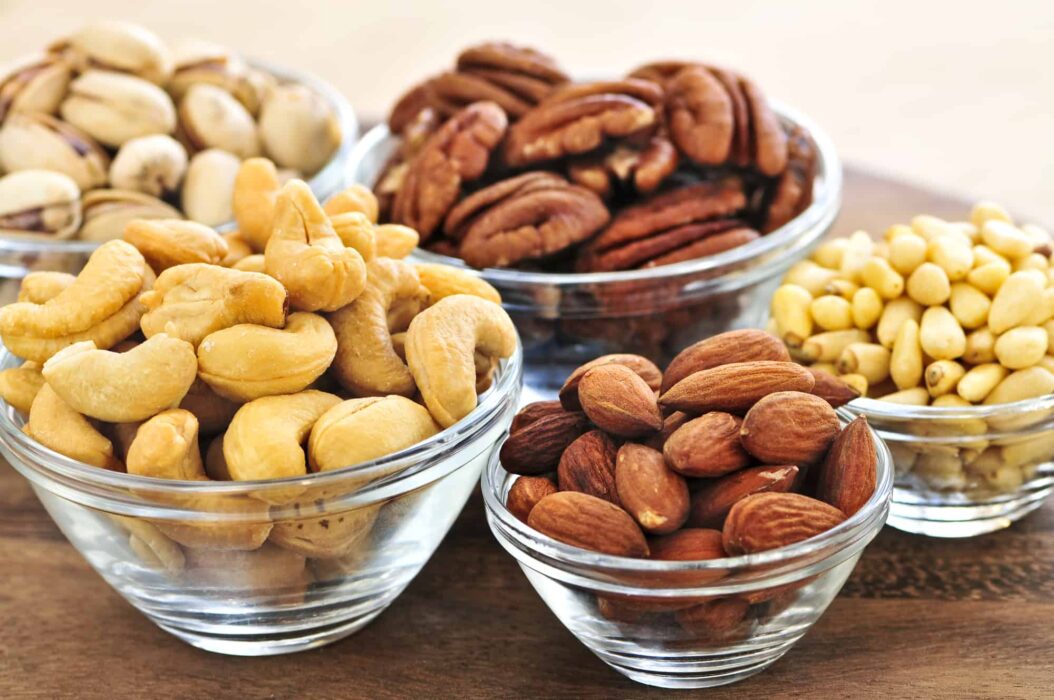
Hazelnuts
Are hazelnuts keto? 100 grams of hazelnuts contain:
- 589 calories
- 19 grams of protein
- 56 grams of fat
- 19 grams of carbohydrates
- 15 grams of fiber
- 4 grams of net carbs.
Hazelnuts are keto. Hazelnuts contain B vitamins, vitamins A, C, E, K, PP, niacin, micro, and macro elements. There are iron, iodine, copper, manganese, zinc, fluorine, selenium, potassium, magnesium, calcium, sodium, sulfur, and phosphorus. It contains amino acids and fatty acids, including Omega-3.
This nut is recommended for recovery. It supplies the body with missing vitamins and microelements and strengthens the walls of blood vessels and heart muscle. Regular consumption of nuts will prevent the formation of cholesterol plaques, the development of varicose veins, and thrombophlebitis.
Hazelnuts have a beneficial effect on the walls of blood vessels, strengthening them and making them elastic. They also strengthen the immune system. The nut provides invaluable help for the liver: it cleans from decay products, and prevents the accumulation of toxic substances.
Hazelnuts soothe the central nervous system, relieve nervous tension, eliminate anxiety, and prevent insomnia. It is necessary for men’s health – nuts increase the production of sex hormones and the level of sex drive. Hazelnuts are used in the prevention of prostate diseases. Eating them gives strength, relieves inflammation, and normalizes sexual function both in men and women.
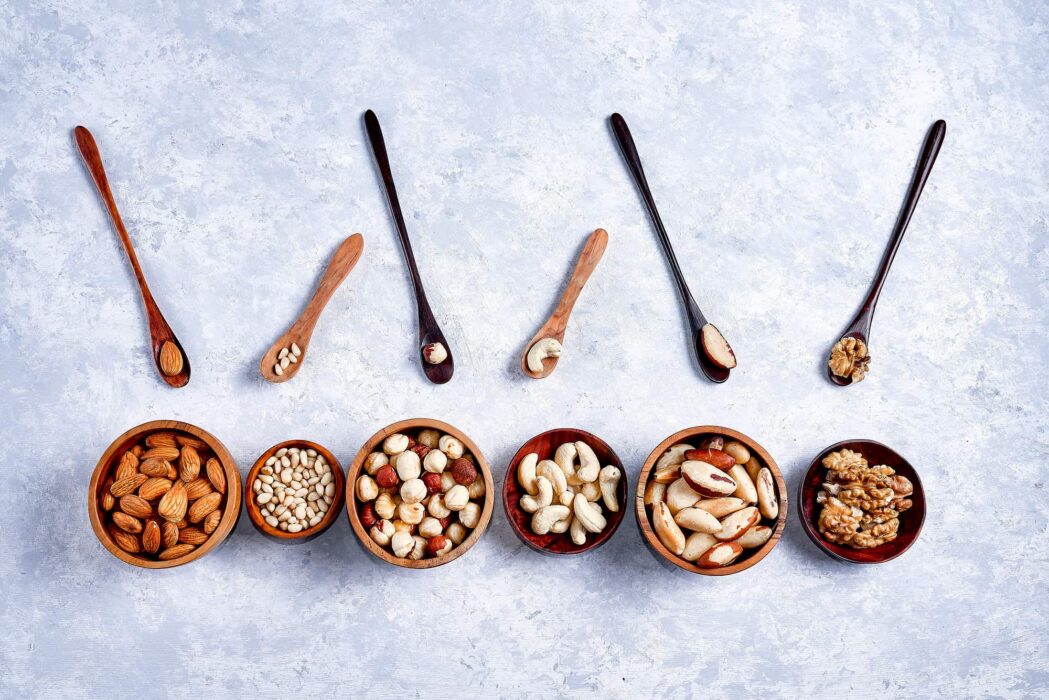
Macadamia Nuts
Are Macadamia nuts keto? 100 grams of macadamia nuts contain:
- 583 calories
- 13 grams of protein
- 55 grams of fat
- 16 grams of carbohydrates
- 10 grams of fiber
- 6 grams of net carbs.
Macadamia nuts are keto. Macadamia is a source of valuable nutrients. This nut helps with migraines, relieves fatigue, nourishes and moisturizes the skin, heals burns, and removes cholesterol from the body. Macadamia nut is a source of calcium and other minerals. It is low in carbohydrates but relatively high in fat, so regular consumption of these nutritious nuts lowers the risk of heart disease.
It also relieves the symptoms of certain types of cancer and even promotes weight loss, despite the high-calorie content. Macadamia also contains essential oils, fats, carbohydrates, proteins, fiber, minerals, and various vitamins.
Macadamia nuts help with migraines and bone diseases. They are useful for arthritis, are used for vitamin deficiency, and treat angina. Macadamia oil has antioxidant and anti-aging properties and is an excellent treatment for dry skin. It stimulates blood microcirculation, heals cellulite, and is useful for varicose veins and rosacea. It is also used in cosmetology for hair, strengthens it, and makes it shiny.
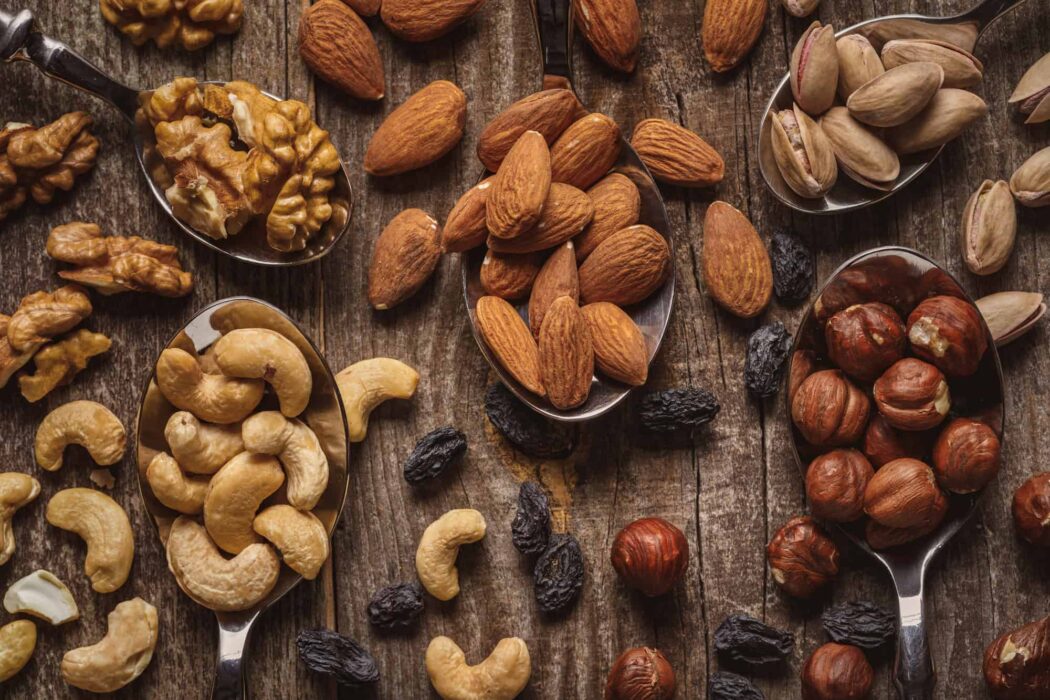
Pili Nuts
Are pili nuts keto? 100 grams of pili nuts contain:
- 614 calories
- 14 grams of protein
- 62 grams of fat
- 4 grams of carbohydrates
- 3 grams of fiber
- 1 gram of net carbs.
Pili nuts are keto-friendly. The pili nut has a rich mineral and vitamin composition, which includes compounds important for your body. The biochemical composition of the nut contains vitamins: A, B, C, and PP, as well as the following trace elements: calcium, zinc, phosphorus, potassium, manganese, iron, and sodium.
Pili nut helps strengthen the immune system and makes the body more resistant to various viral infections. It has a beneficial effect on the cardiovascular system, promotes the elimination of cholesterol, and prevents the formation of plaques on the walls of blood vessels. It reduces the likelihood of thrombosis and heart failure, improves the condition of capillaries and blood vessels, makes them more elastic, and regulates blood sugar levels (can be used to prevent diabetes mellitus).
Due to its high phosphorus content, the pili nut helps to strengthen teeth and bones. Potassium in the composition positively affects the nervous system and improves brain function, helping to regulate the balance of acids, alkalis, and salts in the body. Another beneficial property of pili is the prevention of the development of cancer, particularly breast cancer.
Due to their high magnesium content, pili nuts help with insomnia and other sleep disorders. Regular consumption of a small amount of pili nuts has a beneficial effect on the skin and hair condition, thanks to vitamin E. This nut is a natural source of Omega-7 and Omega-9, which have a beneficial effect on your immune system.
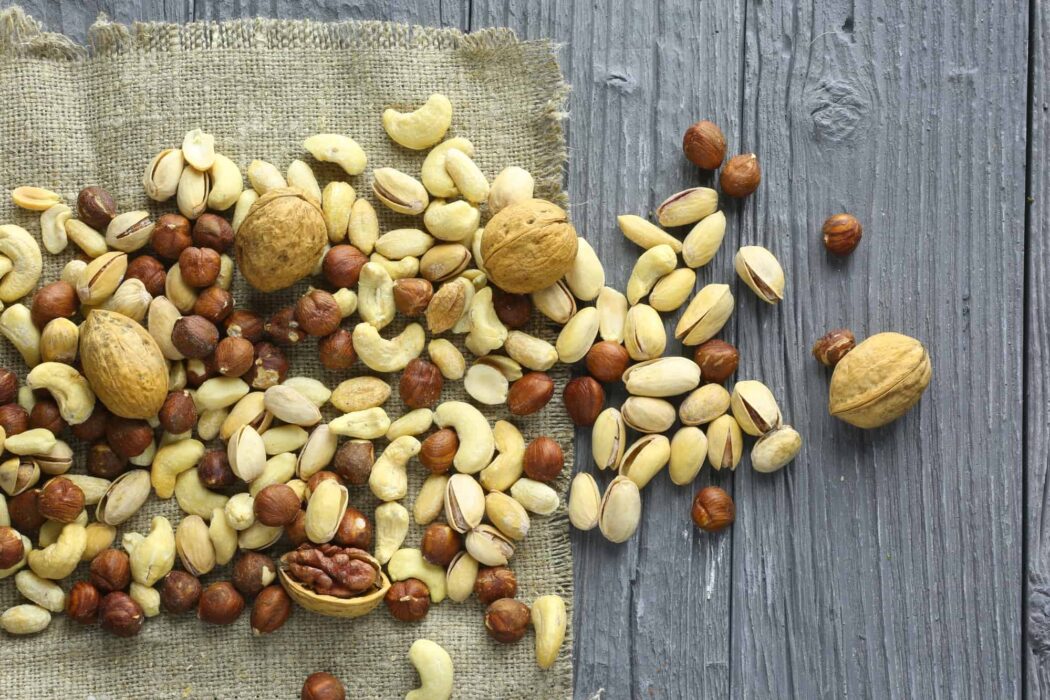
Peanuts
Are peanuts keto-friendly? 100 grams of peanuts contain:
- 599 calories
- 28 grams of protein
- 52 grams of fat
- 15 grams of carbohydrates
- 9 grams of fiber
- 6 grams of net carbs.
Peanuts are keto. They have many health benefits. Thanks to amino acids, calcium is fully assimilated, and peanuts normalize blood cholesterol levels. Their beneficial components stimulate the synthesis of enzymes and hormones and are involved in regeneration processes. The abundance of protein makes peanuts beneficial for athletes looking to build muscle on keto. They are also rich in folic acid. Therefore, they have a beneficial effect on liver function and cell renewal. Peanut is also an excellent food for preventing the development of age-related cognitive pathologies, as it contains nicotinic acid, which restores the membranes of nerve cells.
Should I Count Calories on Keto?
To prevent heart disease and cancer, it is recommended to consume peanuts as a source of vitamin E, and magnesium, calcium, and fluoride, which also helps to strengthen bones. Also, large amounts of magnesium stimulate the processes of eliminating toxic compounds from the body. Manganese has a positive effect on the function of the nervous system, and brain activity and normalizes fat metabolism. Regular use improves mental abilities and concentration, provides benefits in case of an unstable psychoemotional state, and a tendency to depression.
Peanuts help to normalize the content of tryptophan in the body. It improves sleep, mood, helps to recover from surgery, and increases blood clotting. Peanuts improve the quality of blood, eliminate anemia, provide a choleretic effect, and improve the quality of digestion due to fiber. Thanks to methionine, liver function improves, fat accumulation is regulated, and adrenaline is produced. Raw peanuts contain polyphenols that exclude the development of atherosclerosis, cancer, myocardial and vascular diseases and positively affect genitourinary and reproductive function.
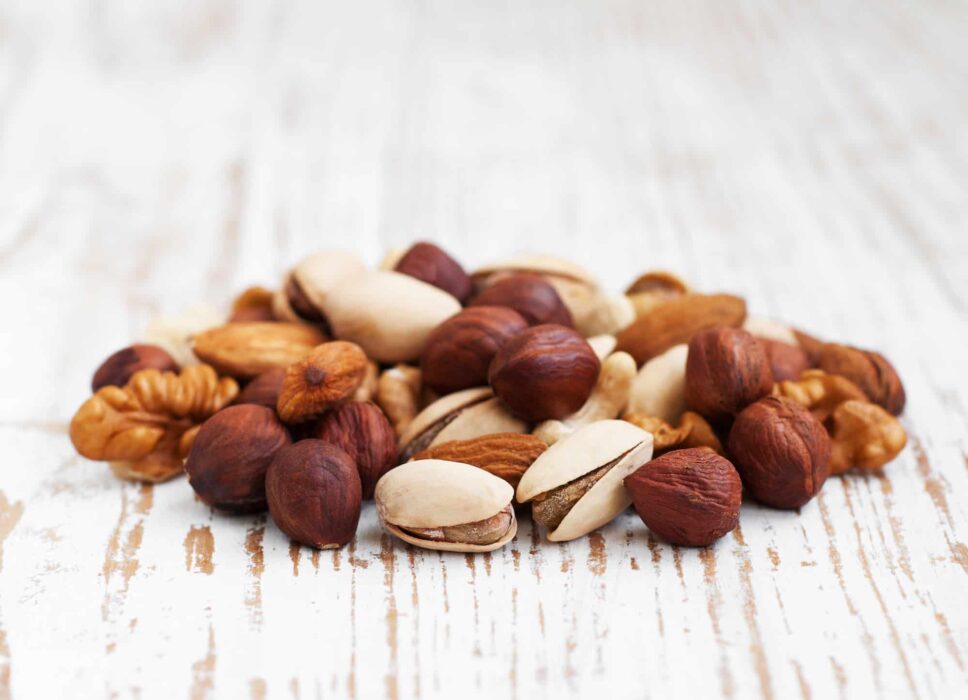
Pecans
Are pecans keto? 100 grams of pecans contain:
- 692 calories
- 9 grams of protein
- 72 grams of fat
- 13 grams of carbohydrates
- 9 grams of fiber
- 4 grams of net carbs.
Pecans are keto. Pecans are extremely high in calories because they are 70% fat. With insufficient nutrition, these nuts are necessary, as a large handful can saturate and energize you. Pecan is considered to be the fattiest of all nuts. It contains many organic compounds and microelements useful for the human body: vitamins B4, E, C B3, B5, potassium, phosphorus, magnesium, calcium, and manganese. Pecans are rich in Omega-3 fatty acids.
Pecan’s oleic acid, monounsaturated fats, and antioxidants help prevent heart attacks and strokes. Magnesium maintains the elasticity of blood vessels. Manganese helps to mobilize the body’s defenses, and improves resistance to infections. Phosphorus is important for the health of bones and teeth and also helps to detoxify the body. Vitamins A and E and ellagic acid are antioxidants that, by preventing the destructive activity of free radicals, inhibit the aging process of the skin.
Vitamin B3 protects against the formation of cholesterol plaques in blood vessels. Carotene, which the pecan is rich in, has a positive effect on vision. B-group vitamins strengthen the immune system, help the nervous system cope with stress, and increase hemoglobin. Pecans, like other nuts, are high in polyunsaturated fatty acids (Omega-3 and Omega-6). Thanks to them and dietary fiber, pecans provide a feeling of fullness for a long period.
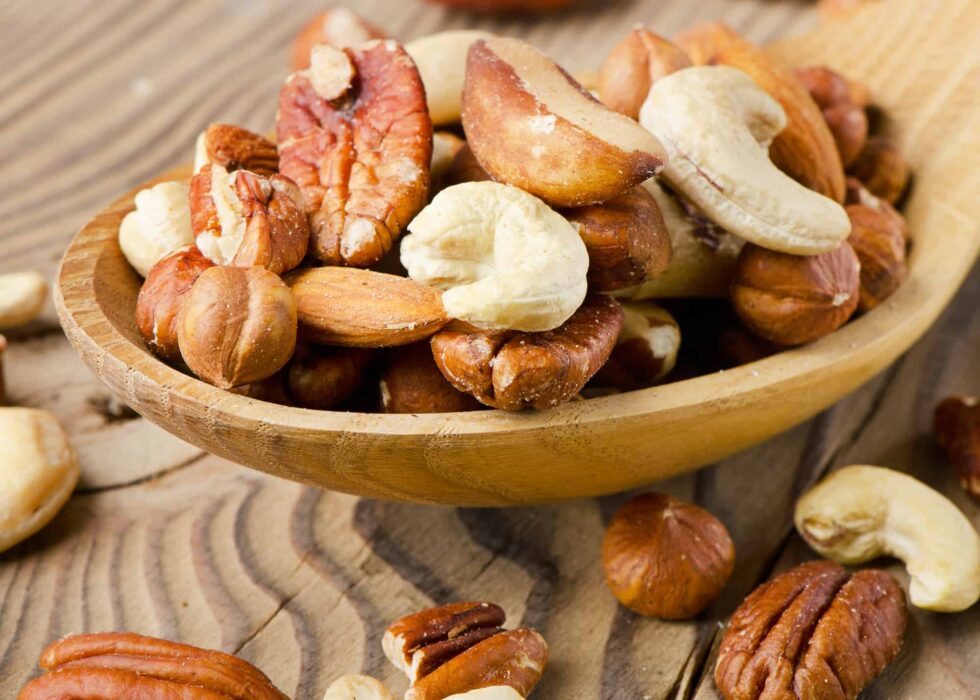
Pine Nuts
Are pine nuts keto? 100 grams of pine nuts contain:
- 635 calories
- 11 grams of protein
- 63 grams of fat
- 10 grams of carbohydrates
- 6grams of fiber
- 4 grams of net carbs.
Pine nuts are keto. Pine nuts are rich in substances valuable to the human body. They contain vitamins B1, B2, B4, B7, PP, E, K, and magnesium, potassium, copper, manganese, and phosphorus. This nut lowers cholesterol levels, strengthens the circulatory system, and reduces stress on the heart muscle. Vitamin K improves blood clotting. High magnesium content helps lower blood pressure and reduces the risk of certain types of cancer. High-quality protein is quickly absorbed, and dietary fiber stimulates intestinal motility and the production of digestive enzymes.
Lutein and zeaxanthin in pine nuts help prevent glaucoma, antioxidants improve mental performance, and tryptophan is beneficial for insomnia. Also, this nut helps to control blood sugar in type 2 diabetes, enhances the immune system, and helps maintain hormonal balance in the body. Pine nuts are one of the so-called “youth elixirs.”
They help slow down the aging process, fight dermatological diseases, and promote glowing skin, hair, and nail growth. The antioxidants they contain fight free radicals and harmful bacteria. Potassium normalizes the water-salt balance, preventing edema. Vitamin E maintains the integrity of cell membranes and protects the skin from harmful ultraviolet radiation. Therefore, with the help of pine nut oil, you can maintain the skin’s elasticity and moisturize it.

Walnuts
Are walnuts keto? 100 grams of walnuts contain:
- 654 calories
- 15 grams of protein
- 65 grams of fat
- 14 grams of carbohydrates
- 8 grams of fiber
- 6 grams of net carbs.
Walnuts are keto. Eating walnuts fill the body with fiber, vitamins, minerals, and healthy fats. Due to their high content of fats, proteins, and fiber, along with an almost complete absence of carbohydrates, walnuts do not affect insulin fluctuations. It means that their use will not lead to weight gain or diabetes.
Another undeniable advantage of this nut is the high content of Omega-3 fatty acids. This type of healthy fat is essential for combating stress, hidden inflammation, and maintaining heart and blood vessel health. The unsaturated fat content of walnuts reaches 65%, which can only be exceeded by fish and chia seeds.
Regular consumption of walnuts improves performance and relieves stress. Due to the fats, vitamins (A, C, B1, B2, B12, K, E, PP) contained in nuts, and minerals – iron and cobalt, walnuts protect the nervous system from overstrain, help restore damaged areas and improve blood circulation.
Regular consumption of walnuts is also associated with effective and safe weight loss. The fact is that the consumption of walnuts activates the part of the brain responsible for controlling appetite. It turns out, in addition to high-calorie content, walnuts can also affect hunger, reducing overall food intake. People who regularly consume walnuts are less likely to suffer from bouts of hunger and therefore eat less during the day. Due to this unusual effect, weight loss is incredibly effective and natural.

Useful Tips
Despite their beneficial properties, all nuts are very high in calories, and we often eat them as a keto snack. However, after keto-adaptation, you should avoid snacks if you want to lose weight. They are okay during the transition and adaptation phase, but nuts are still not the best choice if you get hungry between meals.
You can eat a few nuts after the main dish – with tea or coffee. Figure out how many nuts you can consume, then put the right amount into a separate bowl. Do not eat nuts directly from the pack because this way, you will eat up the entire package and won’t even notice it.
Use nuts in hot dishes, and salads, or grind them into a paste and dip vegetables such as celery and cucumber. You can use nuts in keto pastry. For example, combine coconut and almond flour for perfect keto cookies. You can also make wonderful keto milk by soaking any keto-friendly nuts in water for a few hours. Then add a handful of nuts and a glass of water to a blender, blend until smooth and enjoy!
The Ultimate Guide to Keto Diet: Foods to Eat and to Avoid
You should choose nuts without any additives, sugar, or flavor enhancers. Honey roasted are not your option because they contain too many carbs.
Conclusion
As you can see, most nuts are keto-friendly and can be part of your low-carb diet. However, nuts are very high in calories, and often people eat too much without realizing it. If your goal is to lose weight, then you need to stay in ketosis, and that’s why you need to consume less than 20 grams of net carbs per day. You can grind the nuts into flour, use in various recipes, or turn them into keto milk or butter.
Therefore, make nuts a part of your keto diet, but watch the amount and do not eat too much if you want to lose weight during the keto diet.